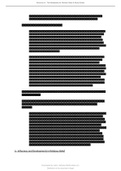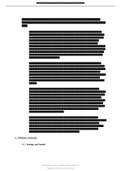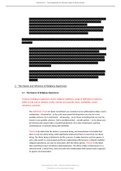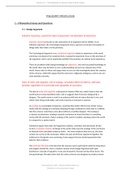PEARSON (PEARSON) • Religious Studies 2016
Latest uploads for Religious Studies 2016 at PEARSON (PEARSON). Looking for Religious Studies 2016 notes at PEARSON (PEARSON)? We have lots of notes, study guides and revision notes available for Religious Studies 2016 at PEARSON (PEARSON).
-
113
-
4
-
22
Modules Religious Studies 2016 at PEARSON (PEARSON)
Notes available for the following courses of Religious Studies 2016 at PEARSON (PEARSON)
- Unit 1 - Philosophical issues and questions 13
- Unit 10 - Ethical language 8RS0 7
- Unit 11 - Deontology, Virtue Ethics and the works of scholars 8RS0 6
- Unit 12 - Medical ethics: beginning and end of life issues 8RS0 3
- Unit 13 - Social, historical and religious context of the New Testament 9RSO03 4
- Unit 14 - Interpreting the text and issues of relationship, purpose and authorship 9RS0 3
- Unit 15 - Ways of interpreting the scripture 9RS0 1
- Unit 16 - Texts and interpretation: the Kingdom of God, conflict, the death and resurrection of Jesus 9RS0 3
- Unit 17 - Scientific and historicalcritical challenges, ethical living and the works of scholars 9RS0 2
- Unit 18 - Religious beliefs, values and teachings 1
- Unit 2 - The nature and influence of religious experience 6
- Unit 25 - Christianity 9RS0 3
- Unit 27 - Islam 6
- Unit 3 - Problems of evil and suffering 5
- Unit 4 - Religious language 12
- Unit 5 - Works of scholars 3
- Unit 6 - Influences of developments in religious belief 5
- Unit 7 - Significant concepts in issues or debates in religion and ethics 8RS0 4
- Unit 8 - A study of three ethical theories 8RS0 10
- Unit 9 - Application of ethical theories to issues of importance 8RS0 4
Popular books PEARSON (PEARSON) • Religious Studies 2016
Latest notes & summaries PEARSON (PEARSON) • Religious Studies 2016
Notes on the three ethical systems tested in your A-Level Religious Studies exam. Very detailed
Summary of Philosophy Unit 6 - Influences and developments in religious belief, including: 6.1 - Views about Life After Death Across a Range of Religious Traditions Immortality of the soul: soul as non-physical and spiritual and con tinuing to exist a2er death of body, Rebirth: belief there is no unchanging soul and importance of karma; Replica theory: no on that one can die in one body and con tinue to live in a different body while being the same person, including after death; Resurrec tio...
Summary of Philosophy Unit 5 - works of scholars specification, including: 5.1 - Context to Critiques of Religious Belief and Points for Discussion Respec tive strengths and weaknesses of religious beliefs; Alterna tive explana tions, issues of probability and postmodern interpreta tions of religion; Key terms, types of atheism and agnos ticism 5.2 - A Comparison between a Critic of Religion, Bertrand Russell, and a Religious Believer, Frederick Copleston The context of the writings of R...
A summary of Philosophy Unit 4 - Religious language specification, including: 4.1 - Analogy and Symbol Analogy: via nega tiva, knowledge about God may be gained by what God is not like, univocal language and problems of anthropomorphism, equivocal language and problems of a8ribu on, signi+cance of propor tional similari ties and dissimilariti es Symbol: types of symbol across a range of religious tradi tions, dis tinc on between signs and symbols, symbols iden tifying and par ticipa ting ...
Summary of Philosophy Unit 3 - the problem of evil and suffering specification, including: 3.1 - Problem of Evil and Su(ering The nature of the problem across a range of religious traditions, types of evil and suffering, moral and non-moral, the challenge to religious belief posed by the inconsistency of the nature of God and the evident existence of evil and suffering challenging belief in the existence of God 3.2 - Theodicies and Solutions to the Problem of Suffering Belief that crea ...
Summary of Philosophy Unit 2 - the nature and influence of religious experience specification notes, including: 2.1 - The Nature of Religious Experience: Context of religious experience across religious traditions, range of dominions related to belief in God and/or ul mate reality, theisti c and monisti c views, ineffability, noe tic, transience, passivity; Types: conversion, prayer, medita tion, mys ticism, numinous, rela tionship between religious experience and proposi onal and non-proposi...
Summary of philosophy unit 1 - philosophical issues and questions specification. Design argument: Inducti ve reasoning, a posteriori types of arguments, interpretation of experience; Types of order and regularity, role of analogy, cumulati ve e/ect of evidence, anthropic principle, regulari es of co-principle and regulariti es of succession; Strengths and weaknesses of Design Arguments: probability rather than proof, alternati ve interpreta tions, including evolu tion and deism, challenges to t...
Explore Bentham’s act utilitarianism. -8 marks Achieved grade A.
Explore the key ideas of rule utilitarianism. -8 marks Achieved a grade A.
Edexcel AS/A Level Religious Studies Philosophy - Unit 3 Problems of Evil and Suffering Contains: Key Scholars and Books, Theories on the Existence of Evil, the Logical and Evidential Problem of Evil











